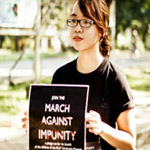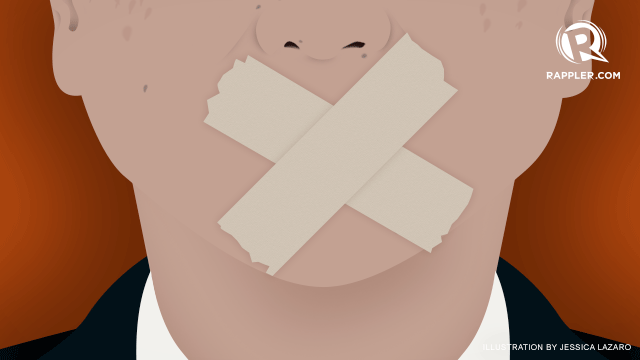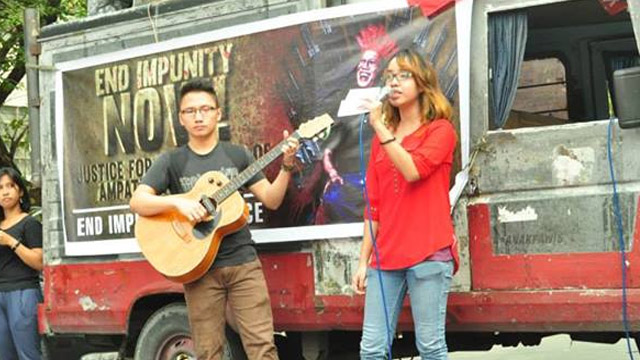SUMMARY
This is AI generated summarization, which may have errors. For context, always refer to the full article.
 Eve of Good Friday, 2005. A man knocked on the door of Marlene Esperat’s home in Tacurog City, Sultan Kudarat.
Eve of Good Friday, 2005. A man knocked on the door of Marlene Esperat’s home in Tacurog City, Sultan Kudarat.
Esperat greeted him. The man responded with a gunshot to her head.
Esperat, a journalist who helped expose the fertilizer scam, dropped in front of her 10-year-old son.
Nothing new. She was just one of the many victims of unsolved media killings in the Philippines.
Nothing new: Esperat, whose husband has also been killed, was also one of the over 50 victims of unsolved media killings in the Philippines.
Nothing new. Almost a decade after, justice has not been served.
This was one of the lessons I learned in college that stuck to me more than the AP stylebook did.
I am a journalism student wanting to be a journalist, to uncover the truth in every story. However, in this field, it seems that many are silenced.
Fundamental right

In media law class, we learned that the Philippines is one of the few countries that recognized press freedom as a fundamental right.
It was separated in Article III, Sec. 4 of our constitution from other freedoms: “No law shall be passed abridging the freedom of speech, of expression, or of the press, or the right of the people peaceably to assemble and petition the government for redress of grievances.”
This is because we recognize the historical role of media and free expression in building and maintaining a democratic society.
After Martial Law, when curtailment of freedoms was rampant, it was the press that helped revive the people’s trust in the government. (READ: Journalists as agents of change)
Ironically, after democracy was restored, press freedom has been rampantly violated yet again.
We are yet to have a genuine Freedom of Information law, which is supposed to ensure transparency and accountability in our government offices.
We are yet to have a Magna Carta for Journalists, which will heighten security and safety for media practitioners. We are yet to remove the criminal penalty for libel which makes criticism a basis for imprisoning someone as if he or she were a murderer.
Instead, we passed a Data Privacy Law, which gives government officials the “right” to keep private documents they do not want to be seen.
We passed a Cybercrime Prevention Law – and held it constitutional. We continue to witness inadequate funding and closing down of campus and public press firms.
And then there is the worst form of press freedom violation: media killings. We are the 3rd most dangerous country for journalists, next only to Syria and Iraq. (READ: PH gov’t to address media killings)
Despite this, in November 2013, on the 4th year anniversary of the Ampatuan Massacre, the Palace said that the media killings in the country are “not really that serious.” (READ: No more impunity in the PH?) The massacre claimed 58 lives, including 32 from the media.
The worst part of it is when the children and the future generations grow and see this impunity. (READ: ‘Impunity reigns’) Freedom could be threatened.
Hope

While corruption and abuses are growing, exposing such injustices is becoming more difficult since speaking up can cost one his or her life. In some places, especially outside Metro Manila, the critic is executed. The exposé is stopped.
In my college, I am certain we will never forget, and that we will keep reasserting that freedom when it is threatened by prior restraint or subsequent punishment ( even death). We will continue making the same call that many have made for years now – uphold press freedom, justice for the killed media practitioners, stop killing journalists.
Hopefully Marlene Esperat and victims of the Ampatuan Massacre will one day obtain justice. I wish it would happen before I march with my sablay. And hopefully, the graduates of communication courses will be part of an industry that will be safer and freer of threats. – Rappler.com
Beata Carolino is a Journalism student at the University of the Philippines-Diliman and a Rappler intern. She is the chairperson of the UP College of Mass Communication student council.
Add a comment
How does this make you feel?
There are no comments yet. Add your comment to start the conversation.